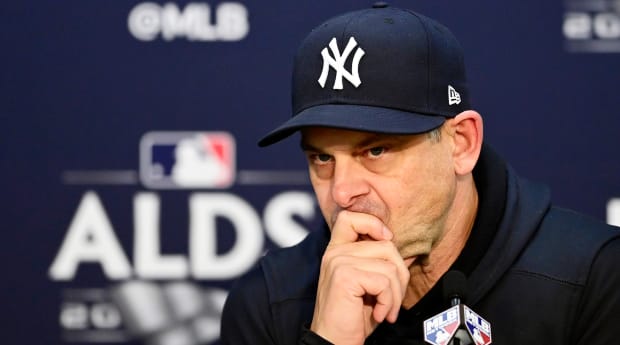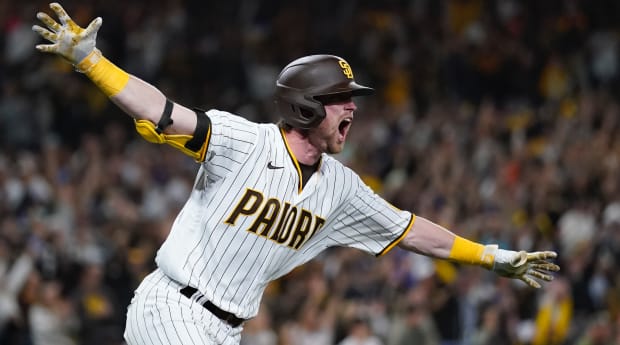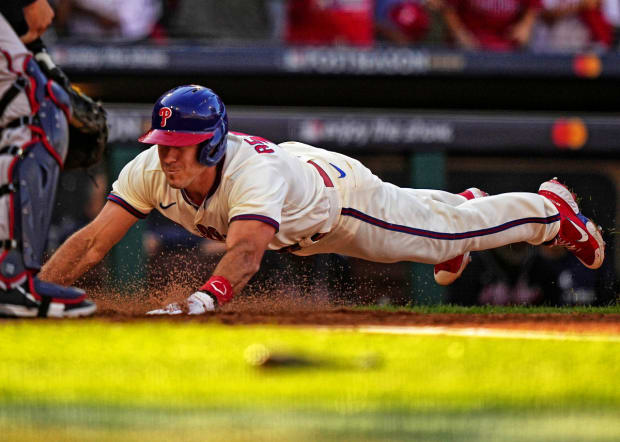
David Dermer/AP
There is no way that Aaron Boone keeps his job. No matter what happens in tonight’s Game 4, or in Monday’s Game 5, if they can get that far—which is a big if based on all that unfolded last night, during and after the game. No matter if he was actually the person who made last night’s baffling bullpen decision. No matter if his options were extremely limited due to injuries (Ron Marinaccio, Scott Effross, Michael King) and abandonment (Aroldis Chapman). No matter what, the Yankees will have a different manager in 2023.
Here’s what happened: With the series tied 1–1, New York held a 5–3 lead when the bottom of the ninth inning began. The Guardians held a 2–1 series lead by the end of it.
Cleveland won 6–5 after scoring three runs on five hits off two relief pitchers, lefty Wandy Peralta and righty Clarke Schmidt, who were assigned an unreasonable task for which they had not been prepared. Peralta started the ninth having already recorded four outs in the game, but was asked to get three more. Only twice in his career has he retired seven players in the same game, and neither of those appearances were potential postseason save situations. Schmidt, who’s been used as both a starter and reliever (and has been shuffled back and forth between the Yankees and Triple-A Scranton/Wilkes-Barre) has two career saves, both of which came because he pitched the final three innings of blowout games. Clay Holmes, the Yankees’ All-Star closer, remained in the bullpen, left to wonder why his manager didn’t call on him to save the most important game of the season.
Boone said Holmes was available to pitch, but only in an “emergency situation.” This seems like an illogical explanation, considering most people would argue that two outs in the ninth inning of a two-run playoff game, with runners on second and third and the No. 2, 3 and 4 hitters due up, is the very definition of emergency.
“Part of the thing with him being available for this series was not really in a back-to-back situation yet,” Boone said last night. “So while he was [feeling] pretty good today and I fully expect him [to be] available tomorrow, it just felt like we needed to stay away there.”
Later, Boone told SNY’s Andy Martino that the “emergency situation” would have been extra innings after having already used the rest of the bullpen. The manager also said that he felt that using Holmes would have put the pitcher’s health in jeopardy.
It’s worth noting here that for much of the second half of the season Holmes was either inconsistent, injured or both. He missed 15 days with lower back spasms in August and didn’t pitch in the final games of the regular season due to a shoulder strain. (The Yankees didn’t place him on the 10-day injured list after he hurt his shoulder because that would’ve made him ineligible to pitch in the division series.) He definitely isn’t 100% healthy, and he hasn’t been for some time now.
Yet that doesn’t mean he was too hurt to pitch. Indeed, Holmes said after the game that he felt fine and was prepared to pitch if Boone had called on him. “They asked, and I said I was good to go if needed,” Holmes said. “Those decisions aren’t mine.”
The thing is, those decisions might not be Boone’s either, at least not entirely. As is the case with most teams, Boone and the Yankees’ front office map out ahead of time how the team should use its bullpen during the upcoming game. Boone’s job is to manage—so long as he does so in accordance with this plan. After the games, it’s his job to answer questions about the decisions that don’t work out. Many times, then, the modern manager’s job is to isolate front-office decision makers from public criticism, to fall on the sword when things go wrong.
This responsibility becomes even more damning for managers when their own players don’t know how or why certain decisions are made. That was the case last night with Holmes, yes, but also with Yankees starter Luis Severino, who said as much after the game when also asked about Holmes’s unavailability.
“He’s the closer,” Severino said. “I was surprised, but I don’t know if he was down. I don’t know if people should be down in the playoffs. That’s something you guys need to ask Boonie or [pitching coach Matt] Blake, but I was surprised not seeing him.”
We all were. One of Boone’s greatest strengths as a manager is his communication skills with the players, the media, umpires and the front office. Whenever he can, he tells his players in advance when they won’t be in the starting lineup. He hardly ever calls out his players publicly when they make mistakes. This irritates many Yankees fans, but it’s one of the reasons why his players love him. He yells at umpires and gets himself ejected frequently, at least relative to other managers across the league, to prevent his players from arguing and getting tossed. He is the bridge between the front office personnel making strategy decisions and the players who have to execute those plans.
But his reputation as a great communicator took a major blow last night. He didn’t let his players know their closer wasn’t pitching in a crucial game, and he failed to effectively explain why that was the case. In doing so, he became the front office’s perfect scapegoat for a season gone wrong. The aftermath of the decision, more than the decision itself, is why he is in his final days as the Yankees’ manager.
Have any questions or comments for our team? Send a note to mlb@si.com.
1. THE OPENER

Ashley Landis/AP
“A goose on the field, a drone above it, a rainy night in Southern California, the biggest postseason upset in 116 years. Weirdness ruled in this National League Division Series between the Padres and Dodgers. But what might be weirdest of all is how the Padres thoroughly exposed every flaw in a 111-win Dodgers team. It didn’t even look like an upset.”
That’s Tom Verducci, writing from Petco Park, where the Padres came from behind to beat the mighty Dodgers in Game 4 of the NLDS and advance to the NLCS against the Phillies.
Padres Expose Dodgers’ Flaws in Stunning Series Upset by Tom Verducci
As Los Angeles stuck to a script that got it in trouble, San Diego hardly looked like the underdog in defeating its division rival in the NLDS.
2. ICYMI
Here’s what happened in the three other games from yesterday:
Guardians Win a Kids Game to Put the Yankees on the Brink of Elimination by Stephanie Apstein
Oscar González made history with his walk-off single, after reminding everyone why we love baseball.
The Mariners’ Marathon Loss Is More of a Beginning Than an End by Greg Bishop
Seattle’s first home MLB playoff game in 21 years brought together a city starved for baseball success—one that still has reason for hope despite the Mariners’ elimination.
‘It Feels Like Failure’: The Braves’ Promising Season Is Over by Emma Baccellieri
This team was better than the one that won the World Series last year. That’s what makes this early exit so painful.
3. WORTH NOTING from Matt Martell
Astros second baseman Jose Altuve is in the worst postseason slump of his career. He went 0-for-16 with one walk and 16 strikeouts in Houston’s sweep of the Mariners in the ALDS. It was the second time Altuve had ever been held hitless in a playoff series and the first time in a series of three or more games. He went 0-for-7 in the 2020 AL wild-card round, when the Astros won the first two games in the best-of-three series against the Twins. He recovered in the next two rounds, going 18-for-41 (.439) in the ALDS and ALCS. Will we see a similar revival next week?
4. W2W4 from Will Laws
Following the Guardians’ stunning Game 3 comeback, Gerrit Cole will be counted upon Sunday to keep New York’s season alive after notching his first home postseason victory as a Yankee his last time out. The good news for New York is that it’s a really tough matchup for Cleveland, if Cole’s 13 innings of one-run ball against the Guardians this year (Tuesday’s Game 1 win included) wasn’t evidence enough.
The Guardians were MLB’s second-worst team at hitting fastballs during the regular season, which isn’t exactly a recipe for success against Cole’s high-90s heater. New York’s $324 million man also had his knuckle curve working like a charm against Cleveland in Game 1, inducing eight whiffs on 11 swings for an absurd 73% whiff rate. Cole’s slider is usually his breaking ball of choice, using it more than twice as often than his curve during the regular season. But he threw 26 knuckle-curves against 24 sliders in Game 1 to great effect despite throwing just three curveballs in the strike zone all night. If Cleveland can’t lay off Cole’s curve when it’s diving in the dirt, this series has a good chance of going to five.
5. THE CLOSER from Emma Baccellieri

Erick W. Rasco/Sports Illustrated
Yesterday was MLB’s last four-game day of the year, and it’s hard to imagine that it could have been any more exhilarating. Here was everything one could hope for in a day of baseball: some great starting pitching, thrilling comebacks, scattered weirdness. (It seemed ages old by the time the Padres were kicking off the Dodgers, but yesterday afternoon did in fact have an inside-the-park home run by a catcher!) Yes, I understand the (fair) questions about diluting the playoffs with expansion. But for a viewing experience as a fan? I don’t think you could have asked for a better day.







